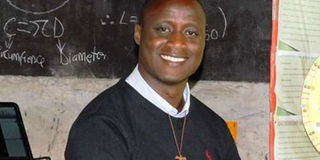Nakuru tutor among 10 finalists for Global Teacher Prize 2019

Mr Peter Tabichi. PHOTO | FILE | NATION MEDIA GROUP
What you need to know:
- Mr Tabichi says he was just trying his luck when he put in his application for the competition.
His family, friends and colleagues are planning a party to celebrate after he made the final shortlist.
The 36-year-old, Egerton University graduate, has been a teacher for 12 years.
“It is unbelievable, God-given and a great honour,’’ are the only words a Kenyan teacher who has been named in top 10 finalists for the $1 million Varkey Foundation Global Teacher Prize 2019 could utter after he was selected.
When he was applying for the competition last year, Peter Tabichi, a mathematics and physics teacher at Keriko Mixed Day Secondary School in Pwani Village in Nakuru, says he was just trying his luck.
“I was aiming at gaining an experience on technology and modern teaching methods. But I learnt a lot through the application. I did not expect to win or emerge anywhere among the top 10 finalists. I just wanted the experience,” says Peter.
But when he was called to be informed that he had been shortlisted among the finalists, Peter was in disbelief.
“I got a call around 3am. I was so shocked, I couldn’t go back to sleep. When I tried preparing my breakfast, I was shaking. But I later composed myself. I feel appreciated,” says Peter.
INSPIRATION
His family, friends and colleagues are planning a party to celebrate his win.
The 36-year-old Egerton University graduate has been a teacher for 12 years and says he became a tutor having been inspired by his father, cousins and uncles.
“I admired the kind of work they were doing for the society. I thought I would make a real difference. The profession is in my blood,” Peter told Nation while waiting to meet Nakuru Governor Lee Kinyanjui.
“His dedication, hard work and passionate belief in his student’s talent has led his poorly-resourced school in remote rural Kenya to emerge victorious after taking on the country’s best schools in national science competitions,” says Varkey Foundation on their website.
TOUGH ODDS
Peter says most of students are from poor families and single-parent homes.
“They learn in poorly-equipped classrooms. Their lives are tough in a region where drought and famine are frequent,” he says.
Drug abuse, teenage pregnancies, dropping out from school, young marriages and suicide are common in the community but he believes they can beat the odds if only they dream big and work hard.
Peter has dedicated his life to the community and teaches them new farming methods to address food insecurity in the famine-prone region.
“I trained the villagers on alternative ways of growing vegetables in gardens. I started peace clubs to unite seven different tribes in our school following the 2007 [post-election violence] that led to killings in Nakuru,” he says.
Through the peace clubs the students became united, conducting debate and tree planting activities.
According to Varkey Foundation, the Kenyan teacher has turned lives around in a school with only one computer, poor internet, and a student-teacher ratio of 58:1.
He started a talent-nurturing club and expanded the school’s Science Club, helping pupils design research projects of such quality that 60 percent now qualify for national competitions.
The teacher mentored his pupils through the Kenya Science and Engineering Fair 2018 – where students showcased a device they had invented to allow blind and deaf people to measure objects.
“This saw this village school come first nationally in the public schools category. The Mathematical Science team also qualified to participate at the INTEL International Science and Engineering Fair 2019 in Arizona, USA, for which they are currently preparing for,” he said.
His students have also won an award from The Royal Society of Chemistry after harnessing local plant life to generate electricity.
“By encouraging my students to participate in science and talent-nurturing clubs, they become very innovative. To be a great teacher, you have to be creative embrace technology and promote modern teaching methods. You have to do more and talk less,” he says.
With four of his colleagues, the teacher also gives low-achieving pupils one-on-one tuition in maths and science subjects outside school hours and at the weekends.
The teacher visits students’ homes and meets their families to identify the challenges they face.
Despite teaching in a school with only one desktop computer with an intermittent connection, he also uses ICT in 80 percent of his lessons to engage students, visiting internet cafes and caching online content to be used offline in class.
He insists teachers must make students believe in themselves.
“This method has dramatically improved my pupils’ achievement and self-esteem,” he adds.
Enrolment has also doubled to 400 over three years.
He says indiscipline cases have fallen from 30 per week to just three. In 2017, only 16 out of 59 students went on to college, while in 2018, 26 students qualified to join universities and colleges.
Girls in the schools have also started outperforming boys, having lead in all fours tests done in the school last year.
“When they become resilient, creative and productive in the society, I get a lot of satisfaction for I act as their greatest destiny enabler,” he says.
Mombasa Aga Khan’s Academy teacher, Dr Maina Gikonyo who emerged among the top 40 finalists says Peter has made Kenya proud.
“Kenya’s son is on the map and I am happy that my colleague is among the top 10. I am happy for my friend,” Gikonyo says.





